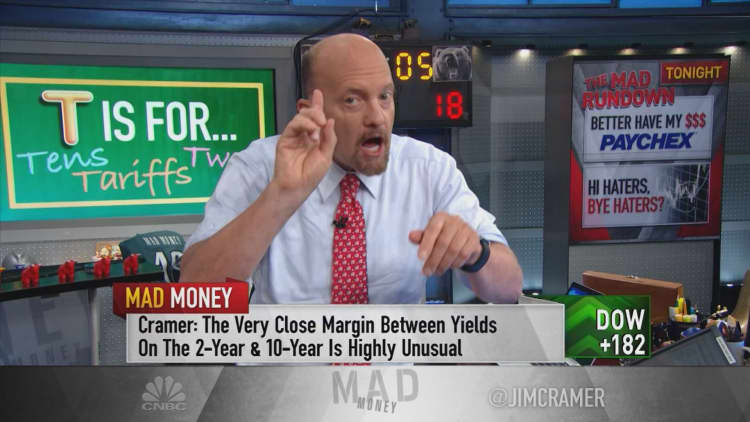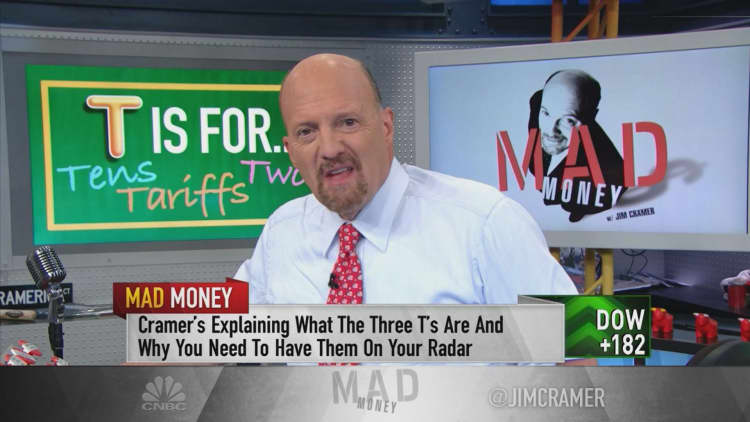
One day of reprieve for U.S. stocks couldn't curb CNBC's Jim Cramer's worries about the threats facing the market.
In particular, the "Mad Money" host was watching the two-year and 10-year U.S. Treasuries on Thursday as the two notes took on what he called a "highly unusual" pattern: the gap between their yields grew tighter.
Specifically, the note currently yields 2.56 percent, while the 10-year U.S. Treasury yields 2.83 percent.
"That’s not a very big difference," Cramer said. "Normally, when the two-year's at 2.5 percent, I would expect the 10-year to be at 3.5 percent."
And when the largest bond market in the world behaves oddly, Cramer takes it upon himself to translate the action for investors.
"Here’s what bonds are saying right now. They're saying that with the two-year Treasury so close in yield to the 10-year Treasury, ... we're almost experiencing a flat yield curve," the "Mad Money" host said. "That matters because when you have a flat yield curve, it does usually presage a recession. It’s a sign that investors are worried about the future."
One ongoing trend that could "send us over the edge" and into recession is the Federal Reserve's agenda for hiking interest rates, Cramer said.
"If the Federal Reserve were to raise rates again too soon, it's possible that the two-year Treasury would indeed yield the same return as the 10-year," he warned.
Worse, if long-term rates don't go any higher, U.S. banks — which tend to benefit from higher interest rates — could suffer because they can't make as much money on long-term loans.
"So, let’s go full circle. Bonds are screaming, ... 'We're about to go into recession if the Fed keeps raising rates, and banks, about a fifth of the , can’t make much money on their core business: lending,'" Cramer said.
And before you write Cramer's theory off as delusion, consider this: in the weeks since the Fed's latest rate hike, the stocks of the banks and the homebuilders, which also benefit from higher rates, have been decimated.
"Right now, banks are making tons of money. Homebuilders are crushing it thanks to a housing shortage, lots of pricing flexibility [and] cheap mortgage money," the "Mad Money" host said. "Nevertheless, the so-called hedge fund playbook, what they all use, tells big-time money managers that they must sell these stocks right here."
Thursday's rally didn't offer Cramer much solace, either.
"I think this is just a relief rally after being down so long. Only some major selling of 10-year Treasurys, something I do not expect, or a pause from the Fed on rate hikes, something I don't expect, would improve this picture," he said.
And while the Fed did express concern Thursday that letting inflation heat up could spur "a significant economic downturn," Cramer was still uncomfortable fully siding with the bulls.
"Because I don’t expect the Fed to stop raising rates, large sellers of bonds to materialize or President Trump to change his mind about tariffs — regardless of the collateral damage to the stock market — I've got to temper my bullishness," he said.
"There’s just not enough of the market that can go higher on a sustained basis right now, and until things change, take days like today as a gift, not the norm."
WATCH: Cramer deciphers the bond market's moves





